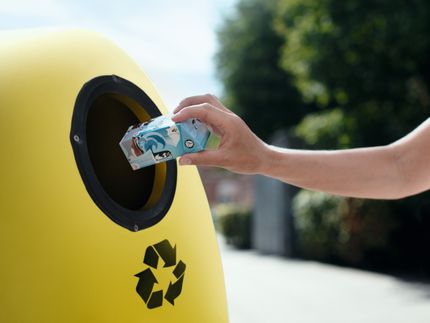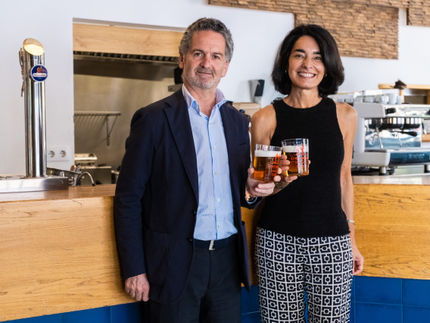Less plastic: how food can be packaged more sustainably in future
Bio-based materials and new recycling processes are driving the shift towards a circular packaging economy
Advertisement
What innovative ways are there to reduce the use of plastics in food packaging? A number of research projects funded by the Federal Ministry of Agriculture, Food and Home Affairs (BMLEH) have developed innovations that can help to make food packaging more sustainable. The projects show how reusable systems can be improved, databases and certifications can be used for greater transparency and sustainable materials can be developed. The projects presented their research results at a symposium in Berlin. This was part of the RePack network, which supports and networks the projects.
What is the RePack network?
Leading institutes in sustainability and packaging research, led by the Institute for Ecological Economy Research (IÖW), support the innovation projects and pool overarching findings. The RePack network is commissioned by the BMLEH and the project sponsor is the Federal Office for Agriculture and Food (BLE). "Networking between all stakeholders plays a crucial role in putting innovative approaches into practice," says Wolfgang Löhe from the BMLEH. He emphasizes that event formats such as the symposium are central to this.
Frieder Rubik, project manager of the RePack network, who researches sustainable production and consumption patterns and the circular economy at the IÖW, emphasizes: "These research projects show how concrete solutions for sustainable food packaging can be created by combining innovation and networked thinking. Only through the cooperation of all stakeholders involved - from production to retail to consumers - can a genuine circular economy be created."
Market maturity
"The program's innovations have transitioned from industrial research to experimental development during its term," says Michaela Filipini from the BLE. "In some cases, prototypes have been developed and demonstrations carried out in real-life applications, and some innovations are close to market maturity." Further cooperation between research, innovators and practical application is required to ensure that all of the innovations can be successfully used on the market.
Improving reusable systems
Reusable packaging is a key lever for avoiding waste. The PFABO project developed a cross-company reusable system that digitally networks logistics as well as the cleaning and return of reusable packaging. Automated return stations and digital tracking using codes make it possible to efficiently track the packaging used and can help to increase acceptance and cost-effectiveness. The system is already being used both in industry and for end consumers. The REPAID project tested various social and technical innovations in catering establishments in order to increase the loan and return rates of reusable containers in the to-go sector. Social incentives and technical improvements, such as return machines, were tested in practice and provide recommendations for restaurants and politicians.
More sustainable materials and new recycling processes
One focus of the research program to reduce fossil-based plastics in food packaging and promote the circular economy is the development of new materials and recycling processes. Six projects are active in this area:
- The KompoPack project uses residues from food production as a raw material and uses them to produce a home-compostable film coating that can replace conventional bioplastics and is already being used industrially.
- The Mobile project developed a mono-material-based barrier film that is fully recyclable while retaining a high level of protection for the food.
- The BUSINESS project is researching bio-based polyethylene furanoate (PEF) made from agricultural residues in order to produce ice cream tubs, for example, which can be recycled and also used as a reusable system.
- The ZykloPLA project is researching a chemical recycling process for the bio-based plastic polylactic acid (PLA) with the aim of using it as a packaging material for food in a circular use.
- In the UTITRANS project, nature-based thermal insulation packaging made from domestic fibers is being developed as a sustainable alternative to polystyrene and polypropylene in order to make the transport containers for food from the producer to the retailer more environmentally friendly.
- The ExtraHerb project looks at the supply chain for potted herbs and uses consumer data to develop sustainable packaging solutions that reduce plastic consumption while ensuring shelf life and quality.
Certifications and databases for greater transparency
Digital technologies and assessment tools can create transparency regarding sustainable packaging. The COPPA project has developed an open collaboration platform that provides comprehensive information on the material composition, quality and origin of plastic packaging via a digital product passport and automatically calculates the carbon footprint. Both commercial users in the production chain and consumers can use a QR code to access the digital profile of packaging.
The PackAn project has developed a digital consumer platform that makes it possible to evaluate packaging in terms of material, supply chain and impact on shelf life. This should make it easier for both the industry and consumers to make a more sustainable choice. The innoCErt project is creating a knowledge base and a catalog of criteria to realistically assess the recyclability of disposable and reusable packaging. The project derives a certification program for reusable packaging and systems from this.
Symposium "Reduce, Reuse, Recycle - sustainable food packaging"
The results of the projects were presented and discussed yesterday at the symposium "Reduce, Reuse, Recycle - sustainable food packaging". The Federal Office for Agriculture and Food (BLE) commissioned the evaluation research institute CEval, GVM Gesellschaft für Verpackungsmarktforschung, ISOE - Institut für sozial-ökologische Forschung and the Sustainable Packaging Institute (SPI) of the Albstadt-Sigmaringen University of Applied Sciences to carry out the networking and transfer measure "RePack-Netzwerk" under the leadership of the IÖW. The project is funded by the innovation promotion program of the Federal Ministry of Agriculture, Food and Home Affairs (BMLEH).
Note: This article has been translated using a computer system without human intervention. LUMITOS offers these automatic translations to present a wider range of current news. Since this article has been translated with automatic translation, it is possible that it contains errors in vocabulary, syntax or grammar. The original article in German can be found here.






























































